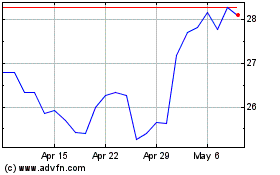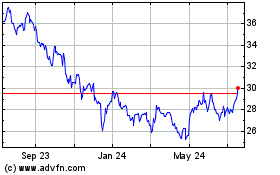By Stu Woo and Peter Loftus
This article is being republished as part of our daily
reproduction of WSJ.com articles that also appeared in the U.S.
print edition of The Wall Street Journal (July 21, 2020).
The prospects of successfully developing a coronavirus vaccine
as soon as this year were buoyed Monday when three of the world's
leading candidates reported positive early trial data.
Vaccines being developed by University of Oxford researchers and
AstraZeneca PLC; Pfizer Inc. and German partner BioNTech SE; and
China's CanSino Biologics all reported fresh updates showing their
shots generated immune responses and were safe to use.
The results cement the trio's position among a few drugmakers
and institutions at the vanguard of the race to develop a Covid-19
vaccine. About 160 vaccines are in development, including about 20
that have started human testing, according to the World Health
Organization. With a clutch of front-runners now having reported
positive early results, attention is rapidly turning to larger,
later-stage trials that would prove the efficacy of the shots in
tens of thousands of volunteers and potentially lead to the
treatments' approval for use.
For the Oxford vaccine, a study of 1,077 healthy adults showed
the shot produced two kinds of immune response that could defend a
body against Covid-19, according to results published in the
Lancet, a British medical journal. The vaccine caused no serious
side effects, the study found.
The early but promising Phase 1-2 results mean researchers
remain on their schedule to have the shot -- described by the WHO's
chief scientist last month as the world's most-advanced vaccine
candidate -- ready for mass production as soon as September.
Separately, Pfizer together with BioNTech on Monday announced
early positive results from a trial in Germany, which supported
results from a corresponding U.S. trial. The pair said the small
study of 60 patients showed their lead vaccine candidate led to
high levels of antibodies for coronavirus, although some study
subjects had flulike symptoms and injection-site reactions.
However, the most advanced results to date for an experimental
coronavirus vaccine were published Monday in the Lancet, for the
second study of a shot codeveloped by CanSino Biologics and the
Beijing Institute of Biotechnology. It was the first time that a
stand-alone phase 2 study for a coronavirus vaccine had been
published in a peer-reviewed journal.
The study of more than 500 volunteers found the vaccine was safe
and induced significant immune responses in the majority of people
after a single shot. Some people receiving the vaccine experienced
fever, fatigue and injection site pain, most of which were mild or
moderate, the researcher said.
Still, all three vaccine candidates updating Monday remain
unproven. All, though, are poised to enter large-scale clinical
trials designed to show whether the shots safely protect people
from Covid-19, which could begin to yield answers in a few months.
Positive results could support the availability of initial doses by
the end of this year.
Researchers for Oxford are already conducting much wider Phase 3
trials of several thousand volunteers in the U.K., Brazil and South
Africa, with a trial for 30,000 people in the U.S. scheduled to
begin in August.
The Pfizer/BioNTech vaccine also is scheduled to begin a major
U.S.-based clinical trial by the end of this month, as is another
candidate co-designed by Moderna Inc. and the National Institutes
of Health.
CanSino researchers also have said, alongside Monday's data,
that they plan to start a Phase 3 study as soon as possible. One
potential issue with the CanSino vaccine, however, is that it
incorporates a different virus, an adenovirus, that serves as a
sort of carrier for the portion of the vaccine that is intended to
trigger an immune response against the coronavirus. Some
participants in the study had pre-existing immunity to the
adenovirus, which seemed to mute the immune responses against the
coronavirus. Researchers said it might be necessary to provide an
additional dose to people with pre-existing immunity to the
adenovirus.
Advances come as various governments are jockeying to secure
vaccine supplies. The U.S. is providing funding for several,
including Oxford's. In May it agreed to pay AstraZeneca, which is
making and distributing the shot, $1.2 billion to secure at least
300 million doses. The company, which also has supply deals with
other countries, is committed to making 2 billion doses, with
perhaps 1 billion available this year.
The Oxford/AstraZeneca results published Monday studied 1,077
adults in the U.K. from ages 18 to 55 who had no history of
Covid-19. About half the participants were given the new vaccine,
while the other half was a control group given a meningitis
vaccine. Researchers found that participants given the Covid-19
vaccine had significant immune responses for both antibodies and
T-cells. The Oxford vaccine uses a similar method as CanSino's, but
with a key difference: It uses a virus from a chimpanzee because
humans are less likely to have a pre-existing immunity to it.
Antibodies are proteins produced by the immune system that bind
to proteins on a virus and can trigger a process that neutralizes
the virus. The vaccine's antibody response peaked by day 28 and
remained high for the duration of the study, which covered the
first 56 days of the continuing trial.
T-cells are white blood cells that can coordinate an immune
response and destroy cells that a virus hijacks. These T-cells may
have a memory that can recall a virus, theoretically providing
long-term protection. The Oxford researchers found favorable T-cell
responses peaking 14 days after vaccination and declining slightly
by day 56.
Researchers found that the Covid-19 vaccine produced only minor
side effects that could be alleviated by acetaminophen, the active
ingredient in Tylenol. About 70% of the people who got the Covid-19
vaccine reported fatigue, and 68% reported a headache.
The study's authors said that they require further clinical
studies, including in older adults, to see whether the vaccine
protects against infection because the results published Monday
focused on immune responses measured in a laboratory.
"There is still much work to be done before we can confirm if
our vaccine will help manage the Covid-19 pandemic, but these early
results hold promise," Oxford researcher Sarah Gilbert said.
Write to Stu Woo at Stu.Woo@wsj.com and Peter Loftus at
peter.loftus@wsj.com
(END) Dow Jones Newswires
July 21, 2020 02:47 ET (06:47 GMT)
Copyright (c) 2020 Dow Jones & Company, Inc.
Pfizer (NYSE:PFE)
Historical Stock Chart
From Mar 2024 to Apr 2024

Pfizer (NYSE:PFE)
Historical Stock Chart
From Apr 2023 to Apr 2024
